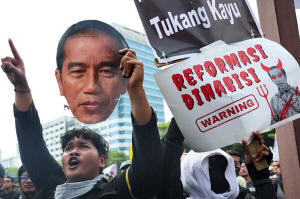Protests across Indonesia as parliament delays change to election law
 Send a link to a friend
Send a link to a friend
 [August 22, 2024]
By Kate Lamb and Stefanno Sulaiman [August 22, 2024]
By Kate Lamb and Stefanno Sulaiman
JAKARTA (Reuters) -Indonesia's parliament postponed ratifying changes to
an elections law on Thursday as protesters attempted to tear down the
gates of parliament in the capital, following outcry over legislation
seen to strengthen the political influence of outgoing President Joko
Widodo.
The plenary session to pass the changes was delayed due to a lack of a
quorum, legislator Habiburokhman told reporters outside the parliament
building.
It is unclear if parliament will reconvene to pass the law before the
registration for regional elections opens next Tuesday.
The parliament planned to ratify changes that would have reversed a
ruling by the constitutional court earlier this week. The legislative
changes would have blocked a vocal government critic in the race for the
influential post of Jakarta governor, and also paved the way for
Widodo's youngest son to run in elections in Java this November.
The power struggle between the parliament and the judiciary comes amid a
week of dramatic political developments in the world's third-largest
democracy, and in the final stretch of the president's second term.
Widodo downplayed the concerns, saying on Wednesday the court ruling and
parliamentary deliberations were part of standard "checks and balances".
The home affairs minister said the changes were intended to provide
legal certainty.

Thousands of demonstrators gathered outside the parliament building in
Jakarta, some breaching part of a fence, but few daring to cross it.
Others draped banners accusing Jokowi of destroying democracy, and
carried colorful banners and props, including a mock guillotine
featuring the president's face.
Indonesian presidential spokesperson Hasan Nasbi called for calm, and
urged protestors to avoid violence, as some scenes showed demonstrators
also throwing rocks at parliament in Bandung.
Protests were held in multiple cities across the country, with tear gas
fired at demonstrators in Semarang, TV footage showed.
"This is the peak of my disdain," said Afif Sidik, a 29-year-old teacher
who joined the protest outside parliament.
"This is a republic. It's a democracy, but if its leadership is decided
by one person, or an oligarch, we can't accept that."
Legal experts and political analysts have described the power struggle
as bordering on a constitutional crisis.
Elections analyst Titi Anggraini characterized the maneuver as
"constitutional insubordination".

[to top of second column]
|

A demonstrator reacts as he holds a cutout of Indonesian President
Joko Widodo, during a protest outside the Indonesian Parliament
against the revisions to the country's election law, which analysts
believe goes through a rushed process of legislation and is designed
to block a popular candidate from running as the capital's governor
in Jakarta, Indonesia, August 22, 2024. REUTERS/Ajeng Dinar Ulfiana

The street protests follow a wave of criticism online, with blue
posters featuring the words "Emergency Warning" above Indonesia's
national eagle proliferating on social media.
The rupiah and Jakarta's main stock index slumped by midday
Thursday, hit by concerns of protests as well as the country's
widening current account deficit.
'THIS IS A POWER STRUGGLE'
The Constitutional Court on Tuesday revoked a minimum threshold
requirement to nominate candidates in regional elections and kept
the minimum age limit of 30 years for candidates.
That ruling effectively blocks the candidacy of the president's
29-year-old son from contesting the race for deputy governor in
Central Java, and would allow Anies Baswedan, the current favorite,
to run in Jakarta.
But within 24 hours the parliament had tabled an emergency revision
to annul the changes.
All parties except one agreed to the revision.
"Indonesian democracy is once again at a crucial crossroads," Anies
posted on social media platform X, urging legislators to remember
its fate rested in their hands.
The parliament is dominated by a big-tent coalition aligned to the
outgoing president, popularly known as Jokowi, and president-elect
Prabowo Subianto.
Prabowo, who won a landslide victory in February's elections, will
be inaugurated on Oct. 20, with Jokowi's eldest son, Gibran
Rakabuming Raka, as his vice president.

Jokowi is facing mounting criticism for the increasingly bold ways
his government is consolidating power, and his nascent political
dynasty.
"The ruling of the constitutional court is final and binding," said
Bivitri Susanti, from the Jentera School of Law,
"It is not possible for the legislative body to violate the
judiciary's ruling. This is a power struggle."
(Additional reporting by Stanley Widianto and Ananda Teresia;
Editing by John Mair and Stephen Coates)
[© 2024 Thomson Reuters. All rights
reserved.]This material
may not be published, broadcast, rewritten or redistributed.
Thompson Reuters is solely responsible for this content. |